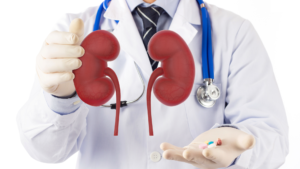Chronic kidney disease is defined as abnormalities of kidney structure or function, present for 3 months or more, with implications for health and classified based on cause, Glomerular filtration rate (GFR) category, and albuminuria category (CGA) (KDIGO, 2013). People may experience fatigue, insomnia, anorexia, nausea and vomiting, loss of taste, and mouth ulcers.
Co-morbidities of CKD are:
1. Anemia
2. Diabetes
3. Dyslipidemia
4. Electrolyte disorders
5. Obesity
6. Hypertension

Protein energy malnutrition (PEM) is common in CKD patients and can result from poor protein and energy intake, uremia, inflammation, hypercatabolism, dialysis, and drug-nutrient interaction. The presence of co-morbidities and PEM increases morbidity, mortality, and reduces the quality of life (K/DOQI, 2002). Early detection and treatment of CKD can prevent or delay the progression of CKD and adverse outcomes like kidney failure, cardiovascular disease (CVD), and death.
The medical nutrition therapy (MNT) is an important part of prolonging kidney life with the following key goals:
1. To prevent and treat protein-energy malnutrition
2. Decrease the risk of progression to renal failure
3. To reduce the risk for cardiovascular disease
4. To prevent fluid-electrolyte imbalance
5. To maintain calcium: phosphorus: vitamin D level
A registered dietitian performs the nutritional assessment and develops an individualized diet plan, provides nutritional counseling, and encourages dietary adherence (K/DOQI, 2000).
1. Low-protein (0.6 g/kg/day), high-energy (30- 35 kcal/kg/day) diet maintains nutritional status while reducing the production of nitrogenous wastes (Indian CKD Guidelines, 2013).
2. Blood glucose control is vital in delaying the progression of CKD in diabetic patients.
3. Uncontrolled dyslipidemia may result in CVD, hence saturated fat and cholesterol must be restricted.
4. Potassium, sodium, and phosphate intake must be advised according to biochemical profile, medication, blood pressure, and kidney function. Fluid intake must be adjusted based on urine output.
Hence, optimizing diet intake to maintain satisfactory nutritional status along with frequent monitoring is crucial in managing CKD.
Or You Can Contact a kidney transplant physician in kolkata

